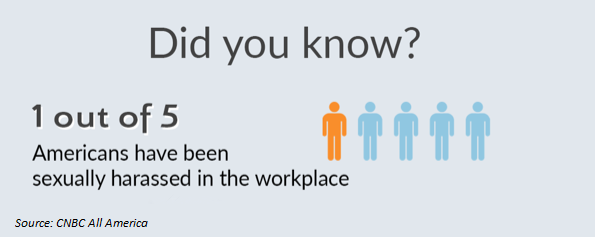As of October 18, 2018, all New York State employers are required by law to adopt a sexual harassment prevention policy AND training for all employees, annually. There are no exceptions to this new law. If you are the proprietor of your business and you are listed as an employee, you are required to obtain sexual harassment prevention training for yourself. Why? Because there are zero risks to educating yourself and your employees on proper conduct in the workplace and training them on what to do if a situation arises that inhibits the employee’s ability to perform their work duties.
Specifically, the training has a deadline of October 9th, 2019. Training must meet or exceed the law’s minimum standard established by the state which includes but is not limited to:
· What makes sexual harassment illegal
· Provide examples of unlawful sexual harassment
· Include remedies available to victims and complaint forms
· Include procedure and rights for reporting claims of harassment and follow up investigations
· Inform supervisors and managers of their responsibilities in responding to sexual harassment claims and incidents
The points above provide a guideline for the minimum training required to comply with the standards set forth by New York State, however, there are additional training offerings that are complementary to sexual harassment prevention training. At the discretion of your HR department, there are additional sessions available via third-party providers (which we’ll get to the benefits of later) that are proven to provide insight and clarity to the employees and managers in your workforce.

Policy
Employer sexual harassment policy must be distributed physically or available to be printed electronically for all employees. New employees should receive the policy prior to beginning work and it is encouraged to have the policy posted in a highly visible area to communicate efforts as a responsible employer
Contractors, subcontractors, vendors, and consultants are not considered employees. However, by law, employers are responsible for actions that occur at the workplace, so it is encouraged to provide the policy and training to anyone who provides services in the workplace.
Complaint forms need not be included in full in the policy. Forms must be located where they can be accessed by employees and it must be made clear where that location is.
Training
Employees including yourself if you are a sole proprietor and all workers regardless of immigration status, exempt or non-exempt, part-time, paid or unpaid intern, seasonal, and temporary workers. The training must be completed by all employees, meeting the minimum standards, by October 9, 2019.
Training must take place annually for all employees. Employers may decide following the October 9th deadline when, annually, they would like to do training, whether based on the employee start date, previous training date, etc.
Employers are liable for employee actions once a new employee is hired. It is suggested that new employees go through sexual harassment training as soon as possible.
If employers have already provided sexual harassment training that meets the requirements, they do not need to be retrained. If the training did not meet the requirements, employers only need to cover what they were missing to meet the minimum standards. For example, if the training that you previously had conducted did not discuss any form of case study, all that would be needed to meet the requirement is to review a set of case studies.
Thinking about Hiring an External Trainer
Having a live trainer to work with employees is the best practice suggested by New York State. Any form of sexual harassment in the workplace is disruptive and dealing with it can be difficult, confusing, and costly. With respect to time, using an outside trainer is almost always more cost-effective. Not only do professional trainers have the skills necessary to educate others, but it is also their specialty, and they make it their job to stay up to date on the most effective ways of training employees at all levels.
As managers and supervisors have very important roles in understanding and responding to sexual harassment that is different from that of other employees, an external trainer is the best way to keep everyone accountable.
Furthermore, there is an aspect of sexual harassment prevention training that sparks conversation. Being a “hot-button issue”, it is good practice to have some sort of moderator facilitate conversation. While not every organization is the same, employees are encouraged to engage with the training and there is an additional degree of comfort in speaking to a non-affiliated expert on the topic when delving into potentially sensitive territory.
MTEC’s Sexual Harassment Prevention Training Workshop covers the state’s minimum standard with interactive training that fosters an understanding of sexual harassment by law, how to spot it, and how to respond. By first presenting the facts and then working in groups to discuss different case studies, employees will be encouraged to discuss, share their thoughts, and ask questions. At the completion of this workshop, all employees will have the skills, resources, and confidence to create a harassment-free workplace.
MTEC is offering this service through a third-party provider for $599 for up to 20 employees. Additional spots (up to 25 total spots per session) can be reserved for $30 per extra seat.
While there is no requirement to prove training has been completed by the October 9th deadline, employers are held liable for accurately reporting incidents of harassment that occur in the workplace regardless of status. Providing training serves as a sort of insurance policy. It provides accurate knowledge to the employees and protection for employers should they be questioned if there were measures taken to educate the members of their workforce.
To schedule a training workshop for your employees or for more information on how we can help contact us at info@hvtdc.org or call (845)391-8214.
Updated: September 19th, 2019 @9:41AM
As of August 12th, 2019, with new legislation signed by Governor Cuomo, there are newly expanded limitations on what is considered to be sexual misconduct in the workplace. The legislation is aligned with Governor Cuomo’s agenda for women’s justice, but that doesn’t mean it only protects women in the workplace. All employees can experience sexual misconduct in the workplace and these laws are intended to protect them all.
To further protect workers and hold abusers accountable, this legislation:
Governor Cuomo Signs Legislation Enacting Sweeping New Workplace Harassment Protections, governor.ny.gov
– Lowers the high bar set for employees to hold employers accountable for sexual harassment by amending under the New York Human Rights Law to make clear that conduct need not be “severe or pervasive” to constitute actionable conduct;
– Protects employees’ rights to pursue complaints by mandating that all non-disclosure agreements in employment contracts include language stating that employees may still file a complaint of harassment or discrimination with a state or local agency and testify or participate in a government investigation;
– Extends the statute of limitations for employment sexual harassment claims filed with the Division of Human Rights from one year to three years;
– Requires employers to provide their employees with notice about the employer’s sexual harassment prevention policy in English as well as the employee’s primary language;
– Expands the coverage of the Human Rights Law to all employers in the state;
– Extends protections against all forms of discrimination in the workplace to all contractors, subcontractors, vendors, consultants, or others providing services; and against all forms of discriminatory harassment to domestic workers;
– Requires courts to interpret the Human Rights Law liberally regardless of the federal rollback of rights;
– Prohibits mandatory arbitration to resolve cases of discrimination and harassment in the workplace;
– Updates the power of the Attorney General to enforce the Human Rights Law; and
– Requires a study on how best to build on recent sexual harassment prevention laws to combat all types of discrimination in the workplace and a review of sexual harassment policies every four years.
